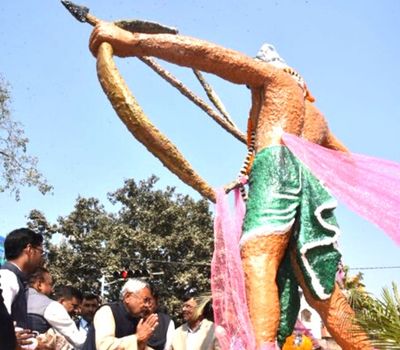Tilka Manjhi, born in 1750 in Bihar, India, stands as a towering figure in the annals of India’s independence struggle. Emerging from humble beginnings in the Bhagalpur district, Tilka Manjhi’s life was marked by resilience and an unwavering commitment to justice.
In the face of British colonial oppression, he rose to lead a courageous rebellion, rallying his community and inspiring future generations. Captured and executed in 1785, Tilka Manjhi’s martyrdom solidified his legacy as a symbol of bravery and resistance.
Today, his memory lives on through institutions and landmarks that bear his name, serving as enduring reminders of his enduring impact on India’s quest for freedom and equality.
Index of Contents
Early Life
Tilka Manjhi, born in 1750 in the Bhagalpur district of present-day Bihar, India, was a significant figure in the early struggle against British colonial rule. He was born into a poor Santhal family, an Adivasi community known for their distinct cultural heritage and resilience.
From an early age, Tilka Manjhi had to grapple with the harsh realities of poverty and exploitation, which were rampant in colonial India. His community, the Santhals, faced severe oppression under the British colonial regime and local zamindars (landlords), who imposed heavy taxes and forced them into labor.
This environment of injustice and suffering deeply impacted Tilka Manjhi, shaping his resolve to fight for his people’s rights and freedom.
Birth and Background
Tilka Manjhi’s early years were marked by hardship and adversity. The Santhals, like many other tribal communities, were marginalized and exploited. Despite these challenges, Tilka Manjhi emerged as a determined and charismatic leader. His upbringing in a community that valued collective well-being and resistance against oppression played a crucial role in developing his leadership qualities.
Education
While there is limited documentation about Tilka Manjhi’s formal education, it is believed that he was largely self-taught. He drew knowledge and inspiration from the rich oral traditions and cultural practices of his community.
The Santhals have a strong tradition of oral history, which includes songs, stories, and folklore that celebrate resistance and valor. These narratives likely influenced Tilka Manjhi’s understanding of justice and freedom.
Freedom Movement
Tilka Manjhi is celebrated as one of the earliest freedom fighters in India. His rebellion against British rule was fueled by the widespread exploitation and suffering of his people. The oppressive tax policies, forced labor, and the overall brutality of the British colonial administration galvanized him into action. His resistance laid the groundwork for subsequent tribal uprisings and movements against British rule.
Rebellion against British Rule
Tilka Manjhi’s rebellion was a direct response to the British exploitation of his community. In 1784, he mobilized the Santhal community and other local tribes to rise against the British authorities and the oppressive landlords. His leadership and the community’s collective frustration led to a well-organized insurgency.
He employed guerrilla warfare tactics, using the dense forests and rugged terrain of Bhagalpur to his advantage. These tactics included surprise attacks on British officials and strategic strikes against colonial outposts. The rebellion posed a significant challenge to the British forces, who were unaccustomed to such forms of resistance.
Leadership and Tactics
Tilka Manjhi was a natural leader with the ability to inspire and mobilize people. His deep understanding of the local terrain and the socio-political dynamics of his community enabled him to devise effective strategies against the British. He was known for his bravery and was often at the forefront of battles, leading his people with unwavering courage.
His leadership style was inclusive, drawing strength from the collective will of his people. He fostered a sense of unity and purpose among the various tribal groups, which was crucial for sustaining the rebellion. Tilka Manjhi’s tactics not only inflicted significant damage on the British forces but also demonstrated the potential of organized resistance by indigenous communities.
Death
The British authorities, recognizing the threat posed by Tilka Manjhi, launched a concerted effort to capture him. In 1785, after a prolonged struggle, Tilka Manjhi was captured by British forces. He was brutally tortured and later hanged to death. His execution was a grim reminder of the lengths to which the British would go to suppress resistance.
Despite his death, Tilka Manjhi’s legacy endured. His martyrdom became a symbol of resistance and bravery, inspiring future generations of freedom fighters. His sacrifice highlighted the profound impact of indigenous resistance on the broader Indian independence movement.
Legacy
Tilka Manjhi’s legacy is deeply embedded in the history of the Santhal community and the Indian independence movement. In the Bhagalpur district of Bihar, he is celebrated as a hero and a symbol of courage and resistance. His life and sacrifice are commemorated in various ways, including posthumous Honors like educational institutions and places named:
Tilka Manjhi Chowk

Tilka Manjhi Chowk, located at the heart of Bhagalpur Smart City in Bihar, stands as a bustling square and a historic tribute to the legendary Indian freedom fighter, Tilka Manjhi. This vibrant square is a fitting homage to Tilka Manjhi’s bravery and determination in the fight against British colonial rule during the 18th century.
It serves as a powerful reminder of his significant contribution to India’s independence movement. The Chowk is a hub of activity, surrounded by numerous important buildings and monuments, including government offices, shops, and restaurants.
At the center of Tilka Manjhi Chowk stands a magnificent statue of Tilka Manjhi, symbolizing his indomitable spirit and courage. This statue is not only a landmark but also a popular tourist attraction in Bhagalpur Smart City, drawing visitors who wish to pay homage to the great hero.
Visitors to Tilka Manjhi Chowk experience a lively atmosphere filled with street performers, vendors, and residents, all contributing to the vibrant ambiance. The square is also a central venue for community events and gatherings, often hosting festivals and cultural celebrations that reflect the rich heritage of the region.
Overall, Tilka Manjhi Chowk is an integral part of Bhagalpur Smart City, serving as a powerful symbol of the legacy of Tilka Manjhi and the enduring fight for freedom and justice in India. Whether you are a resident, a tourist, or a history enthusiast, Tilka Manjhi Chowk is a must-visit destination in Bhagalpur Smart City, offering both historical significance and a lively cultural experience.
Tilka Manjhi Bhagalpur University
Tilka Manjhi Bhagalpur University, established in 1960, is a prestigious public university located in Bhagalpur, Bihar, India. Named in honor of Tilka Manjhi, the university stands as a testament to the enduring legacy of the 18th-century freedom fighter.
It offers a diverse range of undergraduate and postgraduate programs across arts, science, commerce, and law, known for its strong academic reputation and well-equipped facilities. The university serves as a beacon of higher education in the region, nurturing future leaders and scholars who carry forward the spirit of Tilka Manjhi’s fight for justice and equality.
By providing quality education and fostering an environment of intellectual growth, Tilka Manjhi Bhagalpur University contributes significantly to the development of the region and the nation.
Tilka Manjhi Agriculture College
Located in Godda, Jharkhand, Tilka Manjhi Agriculture College is a premier institution dedicated to agricultural education. Named in memory of Tilka Manjhi, the college honors his legacy and contributions to India’s independence movement.
Established to provide comprehensive education in agriculture, the college offers a range of undergraduate and postgraduate programs designed to equip students with the knowledge and skills needed to excel in the agricultural industry.
Tilka Manjhi Agriculture College boasts strong academic programs, experienced faculty, and modern facilities, making it a leading institution in the field of agricultural education. The college plays a crucial role in preparing students to take on leadership roles in agriculture, contributing to the sector’s growth and development.
Continuing Inspiration…
Tilka Manjhi’s story continues to inspire those who fight for justice and freedom. His leadership and unwavering commitment to his people’s rights remain a powerful testament to the enduring spirit of resistance against oppression.
His legacy is a reminder of the pivotal role played by indigenous leaders in the struggle for India’s independence. Tilka Manjhi’s life and sacrifices are celebrated and remembered through these posthumous honors, ensuring that his spirit and contributions are never forgotten.
The various institutions and landmarks named after Tilka Manjhi serve not only as memorials but also as living embodiments of his ideals. They inspire current and future generations to uphold the principles of justice, equality, and resilience, continuing the fight against oppression and working towards a better and fairer society.
In summary, Tilka Manjhi, born in 1750 in Bihar, India, was a courageous freedom fighter who led a rebellion against British colonial rule. Coming from a humble background, he defied oppression and mobilized his community in a spirited resistance.
Captured and executed in 1785, Tilka Manjhi became a martyr, symbolizing bravery and the fight for justice. His legacy is honored through Tilka Manjhi Chowk in Bhagalpur, Tilka Manjhi Bhagalpur University, and Tilka Manjhi Agriculture College, institutions that perpetuate his memory and ideals. Tilka Manjhi’s life remains an inspiration in India’s quest for freedom and equality.
References:
- “Tilka Manjhi: The First Santhal Rebel.” Tribal Freedom Fighters of India, Link.
- “Tilka Manjhi: Biography of the First Adivasi Rebel.” Adivasi History, Link.
- “Oral Traditions and Resistance: The Legacy of Tilka Manjhi.” Journal of Tribal Studies, Vol. 12, No. 4, Link.
- “Guerrilla Warfare in Colonial India: The Case of Tilka Manjhi.” Indian Historical Review, Link.
- “The Leadership of Tilka Manjhi in the Santhal Rebellion.” History of Indigenous Movements, Link.
- “Tilka Manjhi and the Fight for Freedom.” Bhagalpur Chronicles, Link.
- “Remembering Tilka Manjhi: Martyrdom and Legacy.” Freedom Fighters of India, Link.
- “Tilka Manjhi Bhagalpur University: Honoring a Hero.” University Profiles, Link.
- “Indigenous Leaders in Indian Independence: Tilka Manjhi’s Role.” Indian Independence Archives, Link.

